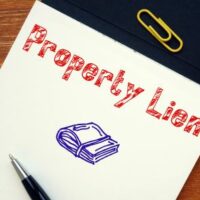Judgment & Involuntary Liens On Florida Real Property

A lien is defined as a claim on another person’s property that exists because of an unpaid debt relating to that property. It forms what is called an encumbrance on property until the debt no longer exists – in other words, if you have a lien on your property, you cannot sell it without any buyer becoming responsible for the lien (which will turn off the strong majority of real estate buyers!). However, there are many, many different kinds of liens that can be placed on property in Florida, and it is very easy to get confused about which one (or more) has been placed on your property. An experienced attorney can help you understand your options.
Several Different Types
Liens can be voluntary, such as a mortgage, or they can be involuntary. Involuntary liens happen when a creditor is able to record a judgment or contract against a debt on the property. There are several types of involuntary liens, because many different types of creditors may be able to use a lien as a method of collecting on the debt they are owed. Some of the most common include:
- Tax liens. While Florida does not have an income tax, and does not levy taxes on many legal proceedings, such as inheritance or gifts, federal tax liens are quite common. These are somewhat unique compared to other types of creditor loans, because the Internal Revenue Service (IRS) is able to place a tax lien on all your property (including financial assets and personal property), rather than just real property or one specific asset under your name.
- Judgment liens. If a creditor wins a civil judgment against you, they can place what is known as a judgment lien on your home as a method of forcing you to pay up.
- Mechanic’s liens. If you have a contractor perform work on your home, and then you fail to pay them, that contractor can place a lien on the property they worked on. In extreme cases, a mechanic’s lien may force the sale of your home if the amount of money in question is high enough.
There are several other types of involuntary liens, but these are the types that tend to affect the most people. It is crucial to take a lien on your property quite seriously, as serious financial consequences can happen if the lien goes unpaid.
Order Of Priority Matters
While it may seem financially hazardous, it is not uncommon for a piece of property to have multiple liens on it, both voluntary and involuntary. For example, a home with a first mortgage may also have a home equity line of credit (HELOC), which is voluntary, but a creditor may also have placed a mechanic’s lien on the same property. If multiple liens exist on your property, it is imperative to understand that there is an order of priority that must be followed in terms of who should be paid first. Generally, whichever lien was filed first will be the first in priority, but there are exceptions – for example, federal tax liens can very often have highest priority over other involuntary liens, particularly if the competing liens are not perfected (recorded appropriately with the relevant authorities).
Mortgages tend to get the highest priority, as they are the most commonly perfected type of lien, and they tend to come before most involuntary liens, though this is not always the case. If you have multiple liens on one piece of property, it is important to understand who will get paid first, because some creditors can force the sale of your home if their liens are not paid. Consulting an experienced attorney can help clear up any questions a person has on the subject.
Call A Tampa Real Estate Lien Attorney
If you have liens on your property, it is important to contact a Tampa real estate attorney so that you can clearly understand your options and your responsibilities. The Seward Law Office has handled many of these cases, and is ready to try and assist you with yours. We can offer experienced and knowledgeable representation at what can be a scary time for many people. Call our offices today to schedule a consultation.
Resource:
irs.gov/businesses/small-businesses-self-employed/understanding-a-federal-tax-lien
